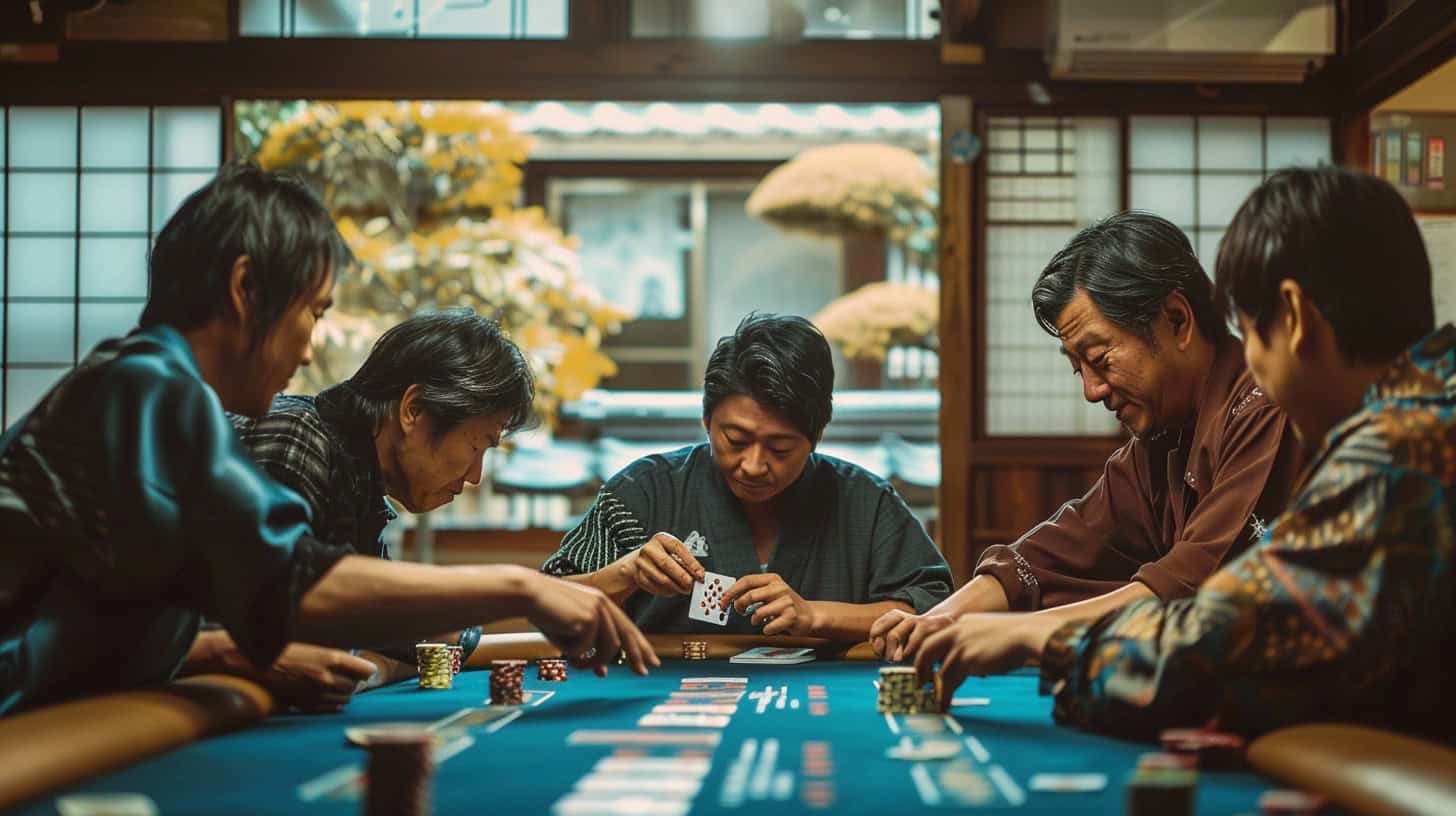Online poker’s rising popularity reshapes Japan’s gaming landscape. Statistics show over 2 million active online poker players nationwide. This blog post explores five transformative impacts reshaping gaming culture.
Read on.
Key Takeaways
Online poker platforms and mobile apps are rapidly gaining popularity in Japan with over 2 million active players, integrating seamlessly with the nation’s love for strategic gaming.
The legal landscape surrounding poker in Japan is shifting, with the legalization of casinos at licensed integrated resorts in 2018, paving the way for potential broader acceptance of poker.
Poker is increasingly being portrayed in Japanese popular culture through manga, anime, TV shows, and celebrity involvement, shaping its cultural acceptance and fueling curiosity among fans.
Major cities like Tokyo, Osaka, and Yokohama have thriving underground poker communities, with players using coded language and referrals to gain access to illegal poker rooms and cash games.
Table of Contents
The Rise of Online Poker in Japan
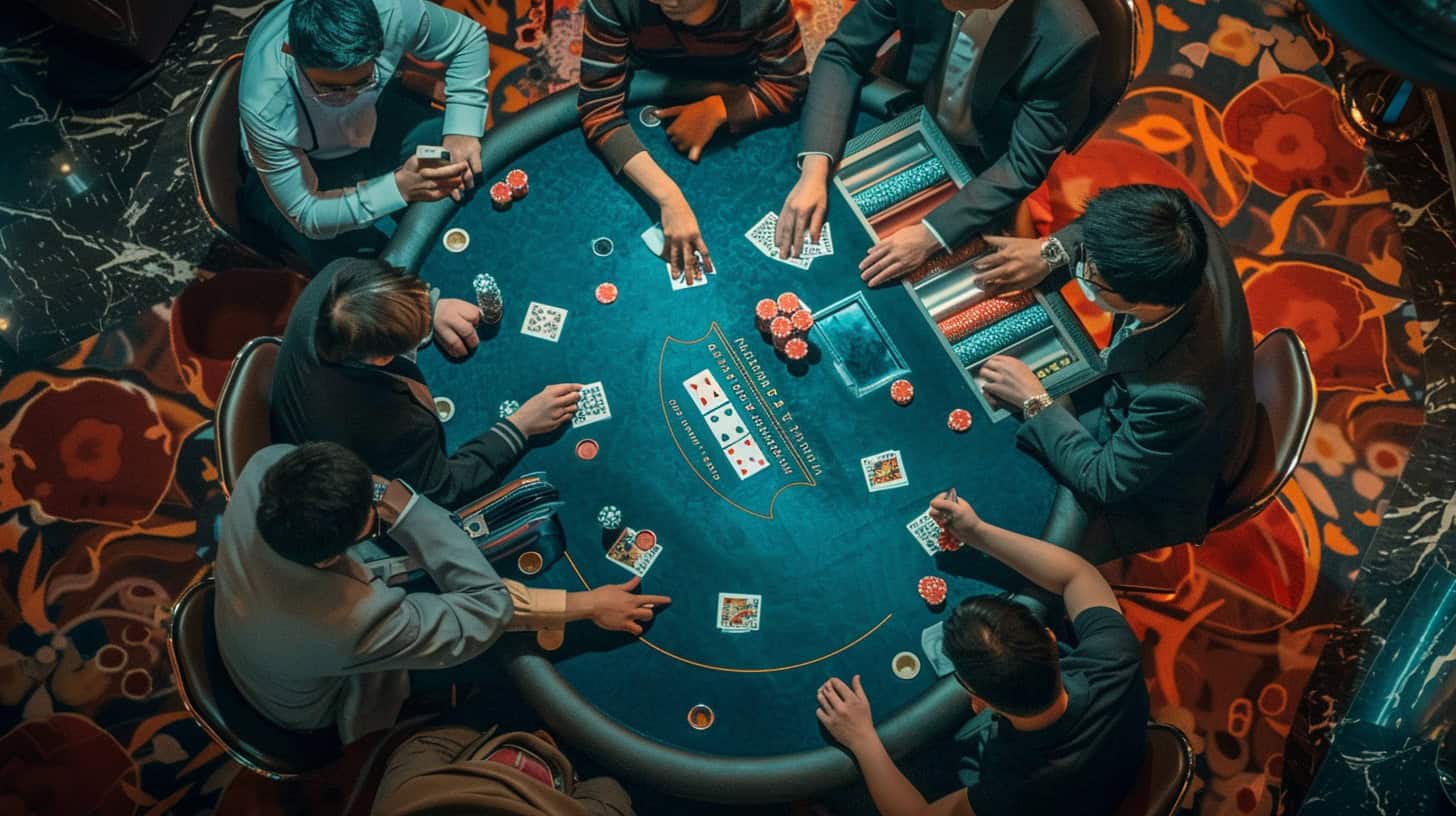
The online poker scene blossoms in Japan. Mobile poker apps and digital platforms integrate seamlessly with Japan’s love for strategy gaming. Online tournaments thrive, catering to enthusiasts across the nation. Many players seek to find no registration casinos, adding to the appeal of instant access and convenience in the digital poker landscape.
Digital Platforms and Traditional Strategy Games
Online poker platforms leverage modern technology, fusing traditional strategic gameplay with digital accessibility. Poker’s strategic depth integrates seamlessly into virtual interfaces, including mobile apps and desktop software.
Tournaments proliferate across platforms, attracting competitors from diverse skill levels. What is a straight in poker? A straight refers to five consecutive cards of different suits, like 5-6-7-8-9.
Such classic hands remain integral to digital poker variants.
Poker transcends borders, uniting global communities through shared passion for strategy and competition. – Maria Konnikova
User-friendly interfaces facilitate social interactions, fostering vibrant online poker ecosystems. Recreational players benefit from tutorials and low-stakes tables, while professionals engage in high-stakes cash games.
Comprehensive statistics tracking enhances strategic analysis. Forums and video guides empower continuous skill development. Digital platforms harmonize poker’s timeless allure with modern accessibility, attracting enthusiasts worldwide.
Increasing Online Tournaments and Gaming Platforms
Online poker tournaments flourish. Diverse platforms cater to skill levels, offer varying buy-ins. Life-changing prizes attract players. Online communities thrive – forums, resources, tutorials, guides foster growth. Sophisticated ecosystems emerge.
Poker sites host tournaments daily, weekly, annually – freerolls to multi-million prizes. PokerStars caters to recreational, professional players via tournaments like WCOOP, SCOOP.
888poker, partypoker offer multi-table tournaments. Large guarantees, overlays create value. Innovative structures like progressive knockouts appeal.
Mobile apps facilitate gameplay anytime, anywhere. Real-money poker apps, play money options develop strategies. Social poker builds communities. Twitch streams, YouTube tutorials enhance learning curves.
Comprehensive training sites nurture skills.
Legal Landscape of Poker in Japan
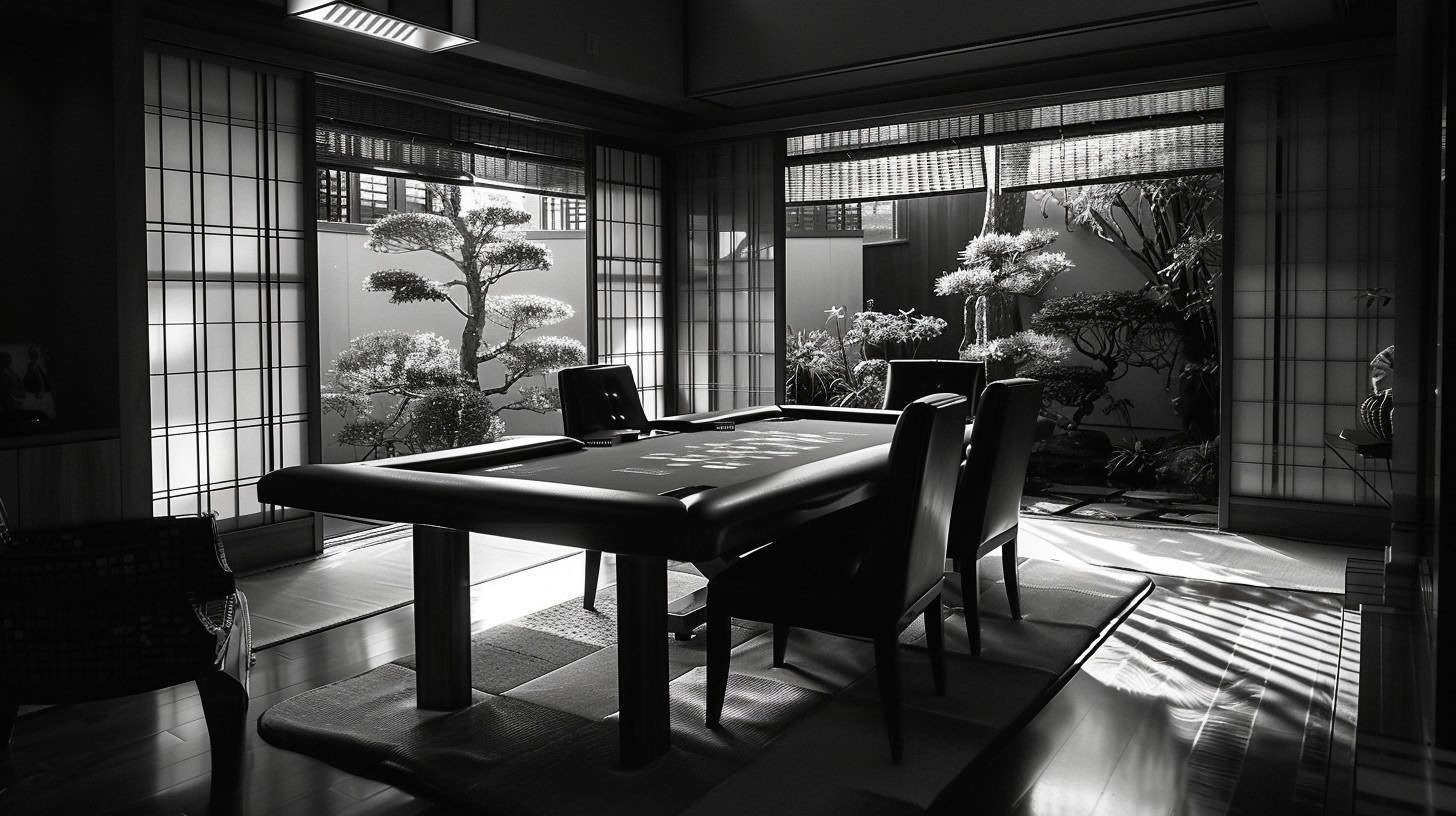
Japan’s stance on poker fluctuates. While gambling remains broadly illegal, specific exceptions exist – Pachinko parlors operate nationwide.
Recent developments indicate shifting attitudes. Casino operators like MGM Resorts, Melco Resorts, and Genting Singapore compete for integrated resort licenses. Legalization may reshape Japan’s gaming landscape.
Overview of Gambling Laws and Regulations
The future belongs to those who believe in the beauty of their dreams. – Eleanor Roosevelt
Gambling remains illegal under Japan’s Penal Code of 1907, with few exceptions. Public sports – horse racing, cycling, and motorboat racing – are legal when licensed by local authorities.
Lotteries face restrictions under the Act Regulating Lotteries and similar laws.
In 2018, the Act on the Development of Specified Integrated Resort Districts legalized casinos at licensed integrated resorts. Casino operators bid for three coveted licenses. Citizens must pay a $55 fee to enter casino floors – a measure aimed at curbing gambling addiction.
The law permits casinos alongside hotels, conference spaces, and entertainment facilities at approved integrated resorts.
Movements Toward Legalizing Casinos and Poker
Building on Japan’s existing gambling regulations, the 2018 bill approved legalizing three integrated casino resorts with restrictions discouraging addiction. Osaka launched the “Request For Proposal” process for an integrated casino resort license in 2019 – five companies applied.
The Casino Administration Committee, chaired by Michio Katamura, supervises operators. International firms like MGM Resorts eye Japan’s licenses.
Poker tournaments in urban hubs cultivate communities. Online platforms facilitate digital poker play, increasing accessibility. Media portrayal shapes cultural acceptance – anime, manga integrate gaming themes.
Risk-taking gameplay aligns with psychological resilience valued in Japanese society. Minimalist aesthetics resonate in game UI design. Virtual worlds exploratory, immersive environments expand entertainment landscapes.
Cultural Acceptance and Media Influence
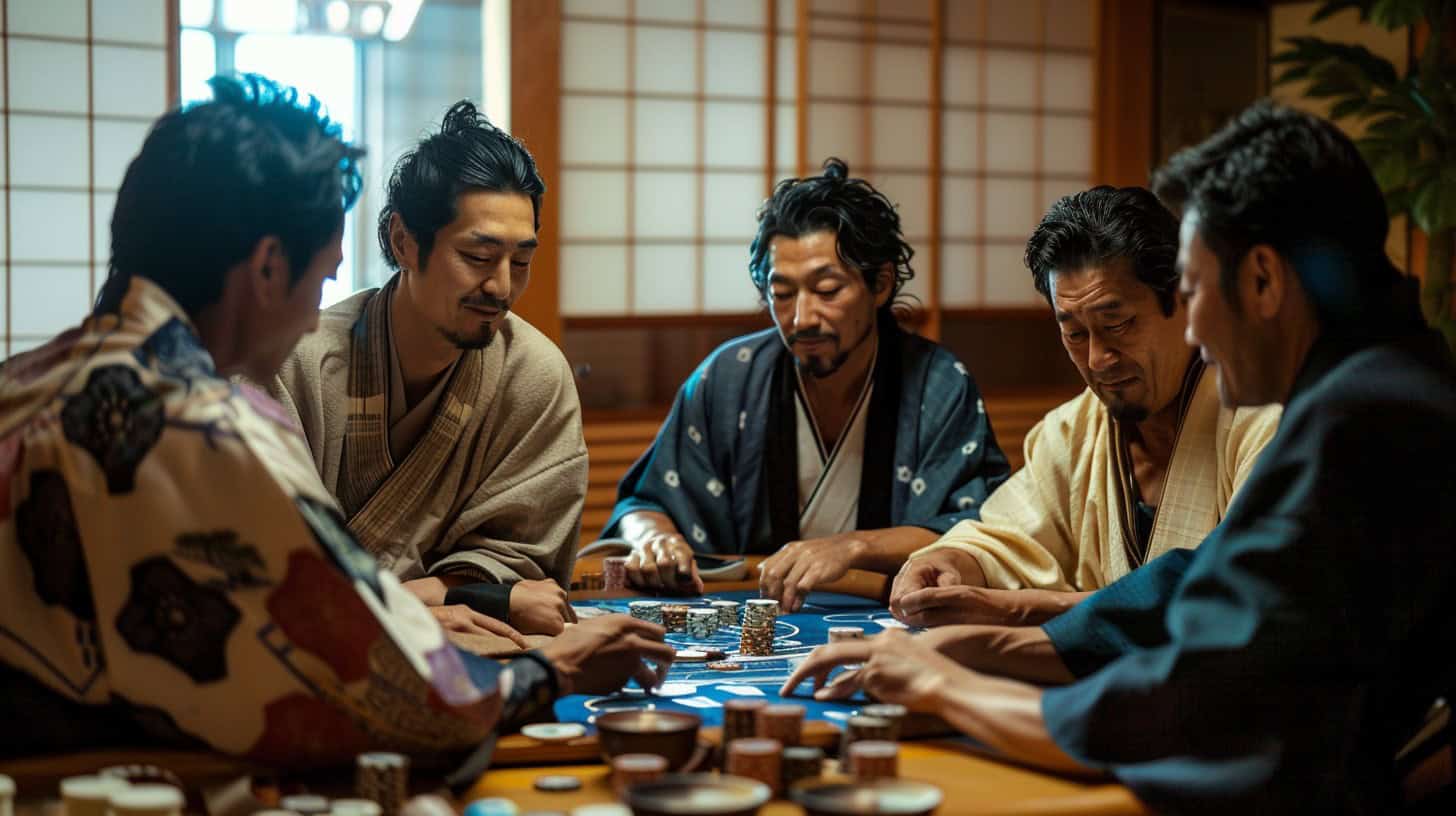
Poker seeps into Japanese pop culture. Media portrayal shapes its perception.
Japan’s mainstream embraces poker through movies, TV shows, and celebrity involvement. Prominent personalities discuss strategies, fueling curiosity among fans. Social media amplifies the hype.
Media Impact on Poker’s Popularity in Japan
Media’s poker portrayal shapes Japanese gaming culture. Manga and anime like Kakegurui, Gambling Apocalypse: Kaiji, Usogui popularize bluffing, strategy. Television shows broadcast tournaments – Texas Hold’em, Omaha.
Social platforms enable interaction, tutorials from professionals. Marketing campaigns highlight skill aspects over pure chance. Pop culture references poker hands, etiquette, lingo.
Japan’s emerging poker community embraces media influence. YouTube channels offer tips, commentary on global tournaments. Streaming poker games on Twitch gains traction. Online platforms Samurai Poker, 108Poker offer mobile apps. Video creators showcase strategies, react to viral hands. Fan communities dissect famous plays on social networks. Media accelerates skill development, nurtures enthusiasts’ passion.
Integration of Poker into Japanese Culture
Poker integrates seamlessly into Japanese culture. Strategic thinking resonates deeply. Online tournaments spike. Mobile apps facilitate access. Gamers praise poker’s complexity – its psychological intricacies mirror traditional art forms.
Poker communities flourish in urban hubs like Tokyo and Osaka. Viewership soars as streamers dissect high-stakes matches. Enthusiasts analyze probabilities, reads, and tactics – disciplines ingrained in Japan’s identity.
Casinos inch closer to legalization, signaling poker’s permanence. An immersive experience encapsulating Japan’s fascination with strategy games reshapes gaming norms.
Poker Hotspots in Japan
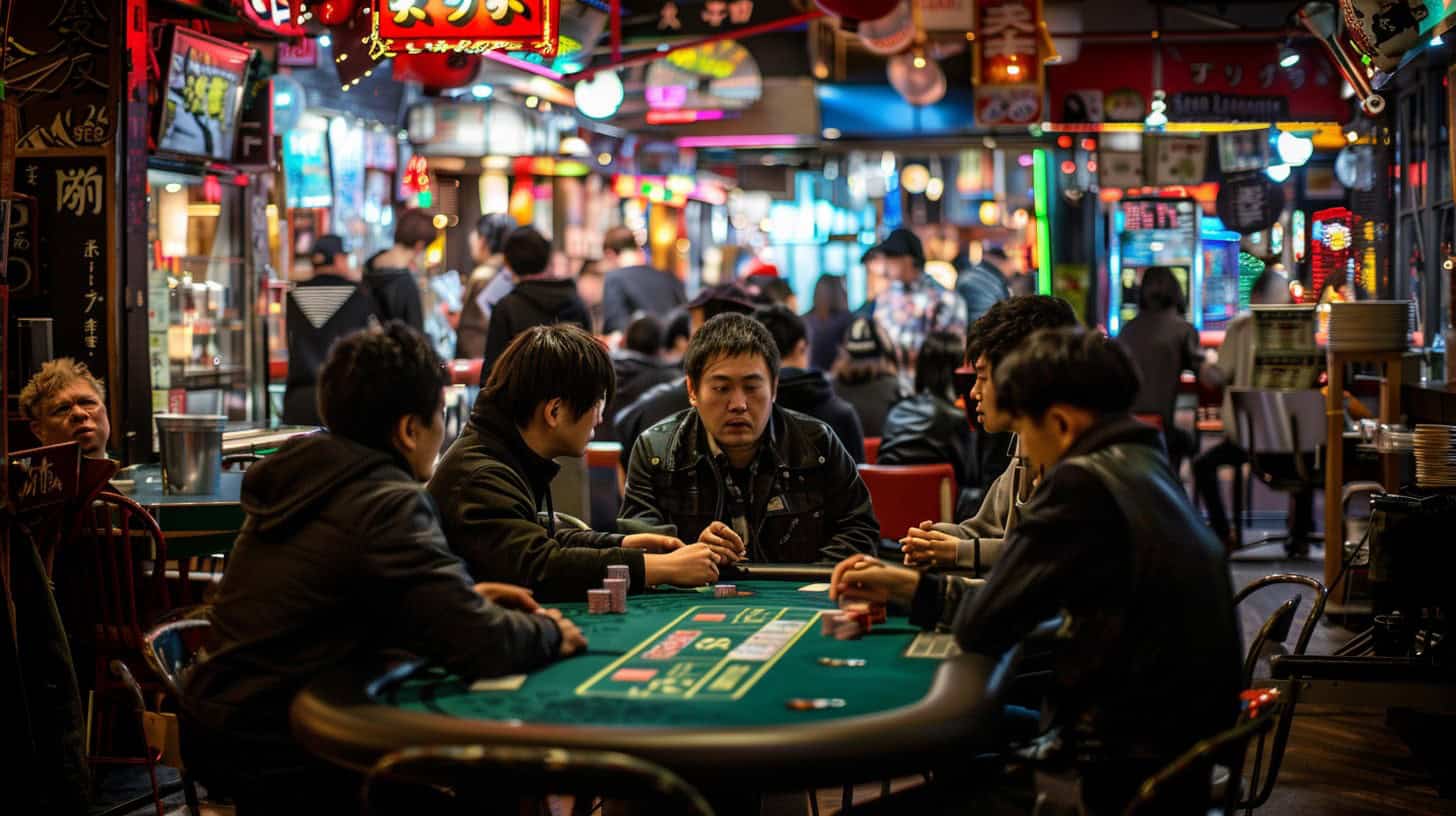
Japan boasts vibrant poker communities in major cities. Tokyo and Osaka witness spirited tournaments – fans flock here.
Key Locations for Poker Games
Tokyo hosts private poker games with a 25-30% surcharge on $1/2 equivalent stakes. Okinawa offers cash games facilitated by the Okinawa Poker Club Facebook group.
Private Games in Tokyo charge hefty surcharges on standard stakes like $1/2 no-limit hold’em. Players report paying 25-30% extra fees in these underground poker rooms.
The Okinawa Poker Club Facebook page connects players to cash game action on the southern Japanese island. Locals utilize social media to organize home games and evade gambling laws.
Taiwan allows legal tournaments but prohibits real money cash games. The International Poker Association in Taipei runs 15 tables where players buy and sell points with a 10% rake.
Underground poker clubs discreetly operate throughout major Japanese cities like Osaka, Kyoto, and Hiroshima. Players use coded language and referrals to gain access to these illegal poker rooms.
Increasing demand for skill-based poker fuels growth of the underground scene across Japan’s urban centers. Social media facilitates connections between local players seeking action while avoiding legal risks.
Development of Poker Communities in Urban Areas
Poker communities flourish in Japan’s cities. Tokyo, Osaka, Yokohama – vibrant urban hubs nurture thriving poker scenes. Poker associations foster connections, strategy discussions online. Despite the illegality of cash games, passion persists.
Underground meetups and tournaments unite enthusiasts. Dedicated players convene weekly, monthly. Shared experiences create tight-knit groups, strategic alliances. Bonds strengthen through lucky hands, dramatic all-ins.
Rivalries develop, friendly banter flows. Poker transcends gambling, becoming a lifestyle.
People Also Ask
Is poker legal in Japan?
Gambling for money is mostly illegal in Japan. But… some forms like parimutuel betting and lottery tickets are allowed. Online casinos and poker rooms operate in a gray area.
How’s poker changing Japan’s gaming scene?
Poker’s influencing Japanese video games. It’s inspiring new battle systems in RPGs. Games like Persona 5 blend poker elements with role-playing. Even fighting games borrow poker’s strategic depth.
Are Japanese gamers embracing poker-style games?
Yes! Digital card games like Hearthstone and Legends of Runeterra are huge. They mix poker skills with fantasy themes. These games are reshaping multiplayer gaming in Japan.
How’s tech boosting poker’s popularity in Japan?
VR headsets and AR are making poker more immersive. Mobile gambling apps are on the rise. Social gaming platforms let friends play together. It’s all part of Japan’s tech-savvy gaming culture.
Is poker affecting Japan’s esports scene?
Absolutely. Poker-inspired games are entering competitive video gaming. Pro gamers and content creators are diving in. It’s adding a new dimension to Japan’s esports landscape.
How’s poker influencing Japanese game design?
Poker’s strategic elements are seeping into various genres. From survival horror to MOBAs, game designers are borrowing poker concepts. It’s creating unique hybrid games that appeal to Japanese tastes.
